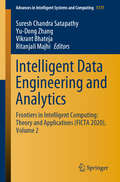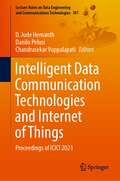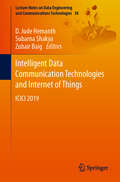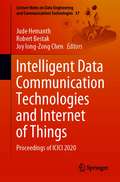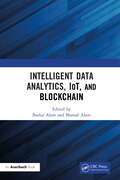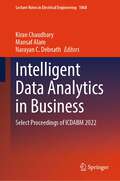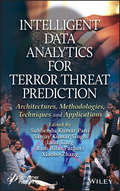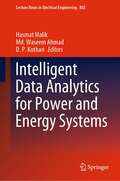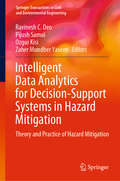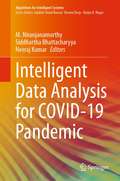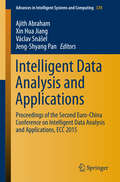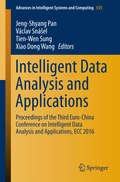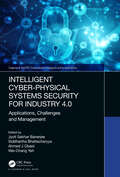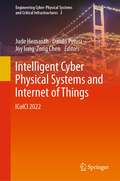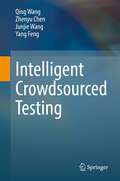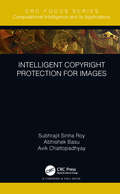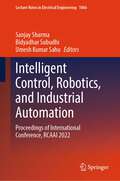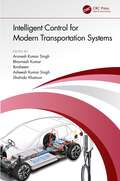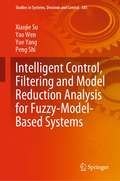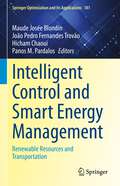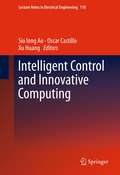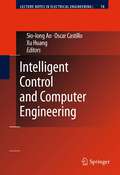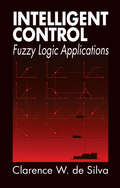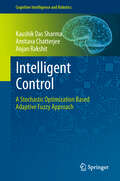- Table View
- List View
Intelligent Data Engineering and Analytics: Frontiers in Intelligent Computing: Theory and Applications (FICTA 2020), Volume 2 (Advances in Intelligent Systems and Computing #1177)
by Suresh Chandra Satapathy Yu-Dong Zhang Vikrant Bhateja Ritanjali MajhiThis book gathers the proceedings of the 8th International Conference on Frontiers of Intelligent Computing: Theory and Applications (FICTA 2020), held at NIT Surathkal, Karnataka, India, on 4–5 January 2020. In these proceedings, researchers, scientists, engineers and practitioners share new ideas and lessons learned in the field of intelligent computing theories with prospective applications in various engineering disciplines. The respective papers cover broad areas of the information and decision sciences, and explore both the theoretical and practical aspects of data-intensive computing, data mining, evolutionary computation, knowledge management and networks, sensor networks, signal processing, wireless networks, protocols and architectures. Given its scope, the book offers a valuable resource for graduate students in various engineering disciplines.
Intelligent Data Communication Technologies and Internet of Things: Proceedings of ICICI 2021 (Lecture Notes on Data Engineering and Communications Technologies #101)
by D. Jude Hemanth Danilo Pelusi Chandrasekar VuppalapatiThis book gathers selected papers presented at the 5th International Conference on Intelligent Data Communication Technologies and Internet of Things (ICICI 2021), organized by JCT College of Engineering and Technology, Coimbatore, Tamil Nadu, India during 27 – 28 August 2021. This book solicits the innovative research ideas and solutions for almost all the intelligent data intensive theories and application domains. The general scope of this book covers the design, architecture, modeling, software, infrastructure and applications of intelligent communication architectures and systems for big data or data-intensive applications. In particular, this book reports the novel and recent research works on big data, mobile and wireless networks, artificial intelligence, machine learning, social network mining, intelligent computing technologies, image analysis, robotics and autonomous systems, data security and privacy.
Intelligent Data Communication Technologies and Internet of Things: ICICI 2019 (Lecture Notes on Data Engineering and Communications Technologies #38)
by D. Jude Hemanth Subarna Shakya Zubair BaigThis book focuses on the emerging advances in distributed communication systems, big data, intelligent computing and Internet of Things, presenting state-of-the-art research in frameworks, algorithms, methodologies, techniques and applications associated with data engineering and wireless distributed communication technologies. In addition, it discusses potential topics like performance analysis, wireless communication networks, data security and privacy, human computer interaction, 5G Networks, and smart automated systems, which will provide insights for the evolving data communication technologies. In a nutshell, this proceedings book compiles novel and high-quality research that offers innovative solutions for communications in IoT networks.
Intelligent Data Communication Technologies and Internet of Things: Proceedings of ICICI 2020 (Lecture Notes on Data Engineering and Communications Technologies #57)
by Jude Hemanth Robert Bestak Joy Iong-Zong ChenThis book solicits the innovative research ideas and solutions for almost all the intelligent data intensive theories and application domains. The proliferation of various mobile and wireless communication networks has paved way to foster a high demand for intelligent data processing and communication technologies. The potential of data in wireless mobile networks is enormous, and it constitutes to improve the communication capabilities profoundly. As the networking and communication applications are becoming more intensive, the management of data resources and its flow between various storage and computing resources are posing significant research challenges to both ICT and data science community. The general scope of this book covers the design, architecture, modeling, software, infrastructure and applications of intelligent communication architectures and systems for big data or data-intensive applications. In particular, this book reports the novel and recent research works on big data, mobile and wireless networks, artificial intelligence, machine learning, social network mining, intelligent computing technologies, image analysis, robotics and autonomous systems, data security and privacy.
Intelligent Data Analytics, IoT, and Blockchain
by Bashir Alam Mansaf AlamThis book focuses on data analytics with machine learning using IoT and blockchain technology. Integrating these three fields by examining their interconnections, Intelligent Data Analytics, IoT, and Blockchain examines the opportunities and challenges of developing systems and applications exploiting these technologies. Written primarily for researchers who are working in this multi-disciplinary field, the book also benefits industry experts and technology executives who want to develop their organizations’ decision-making capabilities. Highlights of the book include: Using image processing with machine learning techniques A deep learning approach for facial recognition A scalable system architecture for smart cities based on cognitive IoT Source authentication of videos shared on social media Survey of blockchain in healthcare Accident prediction by vehicle tracking Big data analytics in disaster management Applicability, limitations, and opportunities of blockchain technology The book presents novel ideas and insights on different aspects of data analytics, blockchain technology, and IoT. It views these technologies as interdisciplinary fields concerning processes and systems that extract knowledge and insights from data. Focusing on recent advances, the book offers a variety of solutions to real-life challenges with an emphasis on security.
Intelligent Data Analytics in Business: Select Proceedings of ICDABM 2022 (Lecture Notes in Electrical Engineering #1068)
by Kiran Chaudhary Mansaf Alam Narayan C. DebnathThis book includes peer-reviewed contributions presented at the International Conference on Data Analytics in Business and Marketing, ICDABM 2022. The book covers topics in data analytics, intelligent data, data management in business and marketing, big data, computational intelligence, and communication networks. The book presents innovative work by leading academics, researchers, and experts from the industry, which is helpful for young researchers and students.
Intelligent Data Analytics for Terror Threat Prediction: Architectures, Methodologies, Techniques, and Applications
by Subhendu Kumar Pani Sanjay Kumar Singh Lalit Garg Ram Bilas Pachori Xiaobo ZhangIntelligent data analytics for terror threat prediction is an emerging field of research at the intersection of information science and computer science, bringing with it a new era of tremendous opportunities and challenges due to plenty of easily available criminal data for further analysis. This book provides innovative insights that will help obtain interventions to undertake emerging dynamic scenarios of criminal activities. Furthermore, it presents emerging issues, challenges and management strategies in public safety and crime control development across various domains. The book will play a vital role in improvising human life to a great extent. Researchers and practitioners working in the fields of data mining, machine learning and artificial intelligence will greatly benefit from this book, which will be a good addition to the state-of-the-art approaches collected for intelligent data analytics. It will also be very beneficial for those who are new to the field and need to quickly become acquainted with the best performing methods. With this book they will be able to compare different approaches and carry forward their research in the most important areas of this field, which has a direct impact on the betterment of human life by maintaining the security of our society. No other book is currently on the market which provides such a good collection of state-of-the-art methods for intelligent data analytics-based models for terror threat prediction, as intelligent data analytics is a newly emerging field and research in data mining and machine learning is still in the early stage of development.
Intelligent Data Analytics for Power and Energy Systems (Lecture Notes in Electrical Engineering #802)
by Hasmat Malik D. P. Kothari Md. Waseem AhmadThis book brings together state-of-the-art advances in intelligent data analytics as driver of the future evolution of PaE systems. In the modern power and energy (PaE) domain, the increasing penetration of renewable energy sources (RES) and the consequent empowerment of consumers as a central and active solution to deal with the generation and development variability are driving the PaE system towards a historic paradigm shift. The small-scale, diversity, and especially the number of new players involved in the PaE system potentiate a significant growth of generated data. Moreover, advances in communication (between IoT devices and M2M: machine to machine, man to machine, etc.) and digitalization hugely increased the volume of data that results from PaE components, installations, and systems operation. This data is becoming more and more important for PaE systems operation, maintenance, planning, and scheduling with relevant impact on all involved entities, from producers, consumer,s and aggregators to market and system operators. However, although the PaE community is fully aware of the intrinsic value of those data, the methods to deal with it still necessitate substantial enhancements, development and research. Intelligent data analytics is thereby playing a fundamental role in this domain, by enabling stakeholders to expand their decision-making method and achieve the awareness on the PaE environment. The editors also included demonstrated codes for presented problems for better understanding for beginners.
Intelligent Data Analytics for Decision-Support Systems in Hazard Mitigation: Theory and Practice of Hazard Mitigation (Springer Transactions in Civil and Environmental Engineering)
by Ravinesh C. Deo Pijush Samui Ozgur Kisi Zaher Mundher YaseenThis book highlights cutting-edge applications of machine learning techniques for disaster management by monitoring, analyzing, and forecasting hydro-meteorological variables. Predictive modelling is a consolidated discipline used to forewarn the possibility of natural hazards. In this book, experts from numerical weather forecast, meteorology, hydrology, engineering, agriculture, economics, and disaster policy-making contribute towards an interdisciplinary framework to construct potent models for hazard risk mitigation. The book will help advance the state of knowledge of artificial intelligence in decision systems to aid disaster management and policy-making. This book can be a useful reference for graduate student, academics, practicing scientists and professionals of disaster management, artificial intelligence, and environmental sciences.
Intelligent Data Analysis for COVID-19 Pandemic (Algorithms for Intelligent Systems)
by M. Niranjanamurthy Siddhartha Bhattacharyya Neeraj KumarThis book presents intelligent data analysis as a tool to fight against COVID-19 pandemic. The intelligent data analysis includes machine learning, natural language processing, and computer vision applications to teach computers to use big data-based models for pattern recognition, explanation, and prediction. These functions are discussed in detail in the book to recognize (diagnose), predict, and explain (treat) COVID-19 infections, and help manage socio-economic impacts. It also discusses primary warnings and alerts; tracking and prediction; data dashboards; diagnosis and prognosis; treatments and cures; and social control by the use of intelligent data analysis. It provides analysis reports, solutions using real-time data, and solution through web applications details.
Intelligent Data Analysis and Applications
by Ajith Abraham Xin Hua Jiang Václav Snášel Jeng-Shyang PanThis volume of Advances in Intelligent Systems and Computing contains accepted papers presented in the main track of ECC 2015, the Second Euro-China Conference on Intelligent Data Analysis and Applications. The aim of ECC is to provide an internationally respected forum for scientific research in the broad area of intelligent data analysis, computational intelligence, signal processing, and all associated applications of AIs. The second edition of ECC was organized jointly by VSB - Technical University of Ostrava, Czech Republic, and Fujian University of Technology, Fuzhou, China. The conference, organized under the patronage of Mr. Miroslav Novak, President of the Moravian-Silesian Region, took place in late June and early July 2015 in the Campus of the VSB - Technical University of Ostrava, Czech Republic.
Intelligent Data Analysis and Applications
by Jeng-Shyang Pan Václav Snášel Tien-Wen Sung Xiao Dong WangThis book gathers papers presented at the ECC 2016, the Third Euro-China Conference on Intelligent Data Analysis and Applications, which was held in Fuzhou City, China from November 7 to 9, 2016. The aim of the ECC is to provide an internationally respected forum for scientific research in the broad areas of intelligent data analysis, computational intelligence, signal processing, and all associated applications of artificial intelligence (AI). The third installment of the ECC was jointly organized by Fujian University of Technology, China, and VSB-Technical University of Ostrava, Czech Republic. The conference was co-sponsored by Taiwan Association for Web Intelligence Consortium, and Immersion Co. , Ltd.
Intelligent Cyber-Physical Systems Security for Industry 4.0: Applications, Challenges and Management (Chapman & Hall/CRC Computational Intelligence and Its Applications)
by Jyoti Sekhar Banerjee Siddhartha Bhattacharyya Ahmed J Obaid Wei-Chang YehIntelligent Cyber-Physical Systems Security for Industry 4.0: Applications, Challenges and Management presents new cyber-physical security findings for Industry 4.0 using emerging technologies like artificial intelligence (with machine/deep learning), data mining, applied mathematics. All these are the essential components for processing data, recognizing patterns, modeling new techniques, and improving the advantages of data science. Features • Presents an integrated approach with Cyber-Physical Systems, CPS security, and Industry 4.0 in one place • Exposes the necessity of security initiatives, standards, security policies, and procedures in the context of industry 4.0 • Suggests solutions for enhancing the protection of 5G and the Internet of Things (IoT) security • Promotes how optimization or intelligent techniques envisage the role of artificial intelligence-machine/deep learning (AI-ML/DL) in cyberphysical systems security for industry 4.0 This book is primarily aimed at graduates, researchers and professionals working in the field of security. Executives concerned with security management, knowledge dissemination, information, and policy development for data and network security in different educational, government, and non-government organizations will also find this book useful.
Intelligent Cyber Physical Systems and Internet of Things: ICoICI 2022 (Engineering Cyber-Physical Systems and Critical Infrastructures #3)
by Jude Hemanth Danilo Pelusi Joy Iong-Zong ChenThis book highlights the potential research areas of Information and Communication Technologies (ICT), such as the research in the field of modern computing and communication technologies that deal with different aspects of data analysis and network connectivity to develop solution for the emerging real-time information system challenges; contains a brief discussion about the progression from information systems to intelligent information systems, development of autonomous systems, real-time implementation of Internet of Things (IoT) and Cyber Physical Systems (CPS), fundamentals of intelligent information systems and analytical activities; helps to gain a significant research knowledge on modern communication technologies from the novel research contributions dealing with different aspects of communication systems, which showcase effective technological solutions that can be used for the implementation of novel distributed wireless communication systems. The individual chapters included in this book will provide a valuable resource for the researchers, scientists, scholars, and research enthusiasts, who have more interest in Information and Communication Technologies (ICT). Encompassing the contributions of professors and researchers from Indian and other foreign universities, this book will be of interest to students, researchers, and practitioners, as well as members of the general public interested in the realm of Internet of Things (IoT) and Cyber Physical Systems (CPS).
An Intelligent Customer Complaint Management System with Application to the Transport and Logistics Industry (Springer Theses)
by Alireza FaedThis thesis addresses the issue of customer complaints in the context of Customer Relationship Management (CRM). After a comprehensive survey of the current literature on CRM, the thesis describes the development of a new intelligent CRM (I-CRM) framework, which integrates text analytics, type mapping, SPSS, structural equation modeling, and linear and fuzzy approaches. This new methodology, in contrast to previous ones, is able to handle customer complaints with respect to different variables, thus allowing organizations to find their key customers and key complaints, and to address and provide solution to the major complaints of the key customers, hence promoting business development. The thesis also describes the successful application of the method to a real-world case, represented by the immeasurable truck drivers complaints at the Fremantle port in Western Australia.
Intelligent Crowdsourced Testing
by Qing Wang Yang Feng Zhenyu Chen Junjie WangIn an article for Wired Magazine in 2006, Jeff Howe defined crowdsourcing as an idea for outsourcing a task that is traditionally performed by a single employee to a large group of people in the form of an open call. Since then, by modifying crowdsourcing into different forms, some of the most successful new companies on the market have used this idea to make people’s lives easier and better. On the other hand, software testing has long been recognized as a time-consuming and expensive activity. Mobile application testing is especially difficult, largely due to compatibility issues: a mobile application must work on devices with different operating systems (e.g. iOS, Android), manufacturers (e.g. Huawei, Samsung) and keypad types (e.g. virtual keypad, hard keypad). One cannot be 100% sure that, just because a tested application works well on one device, it will run smoothly on all others.Crowdsourced testing is an emerging paradigm that can improve the cost-effectiveness of software testing and accelerate the process, especially for mobile applications. It entrusts testing tasks to online crowdworkers whose diverse testing devices/contexts, experience, and skill sets can significantly contribute to more reliable, cost-effective and efficient testing results. It has already been adopted by many software organizations, including Google, Facebook, Amazon and Microsoft. This book provides an intelligent overview of crowdsourced testing research and practice. It employs machine learning, data mining, and deep learning techniques to process the data generated during the crowdsourced testing process, to facilitate the management of crowdsourced testing, and to improve the quality of crowdsourced testing.
Intelligent Copyright Protection for Images (Chapman & Hall/CRC Computational Intelligence and Its Applications)
by Subhrajit Sinha Roy Abhishek Basu Avik ChattopadhyayThis book describes the need of copyright protection for multimedia objects and develops an invisible image watermarking scheme to serve the purpose of copyright protection. Here intelligent systems are introduced to generate a better visual transparency with increased payload.
Intelligent Control, Robotics, and Industrial Automation: Proceedings of International Conference, RCAAI 2022 (Lecture Notes in Electrical Engineering #1066)
by Sanjay Sharma Bidyadhar Subudhi Umesh Kumar SahuThis volume comprises peer-reviewed proceedings of the International Conference on Robotics, Control, Automation, and Artificial Intelligence (RCAAI 2022). It aims to provide a broad spectrum picture of the state of art research and development in the areas of intelligent control, the Internet of Things, machine vision, cybersecurity, robotics, circuits, and sensors, among others. This volume will provide a valuable resource for those in academia and industry.
Intelligent Control for Modern Transportation Systems
by Arunesh Kumar Singh Bhavnesh Kumar Ibraheem Asheesh Kumar Singh Shahida KhatoonThe book comprehensively discusses concepts of artificial intelligence in green transportation systems. It further covers intelligent techniques for precise modeling of complex transportation infrastructure, forecasting and predicting traffic congestion, and intelligent control techniques for maximizing performance and safety. It further provides MATLAB® programs for artificial intelligence techniques. It discusses artificial intelligence-based approaches and technologies in controlling and operating solar photovoltaic systems to generate power for electric vehicles. Highlights how different technological advancements have revolutionized the transportation system. Presents core concepts and principles of soft computing techniques in the control and management of modern transportation systems. Discusses important topics such as speed control, fuel control challenges, transport infrastructure modeling, and safety analysis. Showcases MATLAB® programs for artificial intelligence techniques. Discusses roles, implementation, and approaches of different intelligent techniques in the field of transportation systems. It will serve as an ideal text for professionals, graduate students, and academicians in the fields of electrical engineering, electronics and communication engineering, civil engineering, and computer engineering.
Intelligent Control, Filtering and Model Reduction Analysis for Fuzzy-Model-Based Systems (Studies in Systems, Decision and Control #385)
by Xiaojie Su Yao Wen Yue Yang Peng ShiThis book aims to introduce the state-of-the-art research of stability/performance analysis and optimal synthesis methods for fuzzy-model-based systems. A series of problems are solved with new approaches of design, analysis and synthesis of fuzzy systems, including stabilization control and stability analysis, dynamic output feedback control, fault detection filter design, and reduced-order model approximation. Some efficient techniques, such as Lyapunov stability theory, linear matrix inequality, reciprocally convex approach, and cone complementary linearization method, are utilized in the approaches. This book is a comprehensive reference for researchers and practitioners working on intelligent control, model reduction, and fault detection of fuzzy systems, and is also a useful source of information for senior undergraduates and graduates in these areas. The readers will benefit from some new concepts and methodologies with theoretical and practical significance in system analysis and control synthesis.
Intelligent Control and Smart Energy Management: Renewable Resources and Transportation (Springer Optimization and Its Applications #181)
by Maude Josée Blondin João Pedro Fernandes Trovão Hicham Chaoui Panos M. PardalosThis volume aims to provide a state-of-the-art and the latest advancements in the field of intelligent control and smart energy management. Techniques, combined with technological advances, have enabled the deployment of new operating systems in many engineering applications, especially in the domain of transport and renewable resources. The control and energy management of transportation and renewable resources are shifting towards autonomous reasoning, learning, planning and operating. As a result, these techniques, also referred to as autonomous control and energy management, will become practically ubiquitous soon. The discussions include methods, based on neural control (and others) as well as distributed and intelligent optimization. While the theoretical concepts are detailed and explained, the techniques presented are tailored to transport and renewable resources applications, such as smart grids and automated vehicles. The reader will grasp the most important theoretical concepts as well as to fathom the challenges and needs related to timely practical applications. Additional content includes research perspectives and future direction as well as insight into the devising of techniques that will meet tomorrow’s scientific needs. This contributed volume is for researchers, graduate students, engineers and practitioners in the domains of control, energy, and transportation.
Intelligent Control and Innovative Computing (Lecture Notes in Electrical Engineering #110)
by He Huang Sio Iong Ao Oscar CastilloA large international conference on Advances in Intelligent Control and Innovative Computing was held in Hong Kong, March March 16-18, 2011, under the auspices of the International MultiConference of Engineers and Computer Scientists (IMECS 2010). The IMECS is organized by the International Association of Engineers (IAENG). Intelligent Control and Computer Engineering contains 25 revised and extended research articles written by prominent researchers participating in the conference. Topics covered include artificial intelligence, control engineering, decision supporting systems, automated planning, automation systems, systems identification, modelling and simulation, communication systems, signal processing, and industrial applications. Intelligent Control and Innovative Computing offers the state of the art of tremendous advances in intelligent control and computer engineering and also serves as an excellent reference text for researchers and graduate students, working on intelligent control and computer engineering.
Intelligent Control and Computer Engineering
by Oscar Castillo He Huang Sio-Iong AoA large international conference on Advances in Intelligent Control and Computer Engineering was held in Hong Kong, March 17-19, 2010, under the auspices of the International MultiConference of Engineers and Computer Scientists (IMECS 2010). The IMECS is organized by the International Association of Engineers (IAENG). Intelligent Control and Computer Engineering contains 25 revised and extended research articles written by prominent researchers participating in the conference. Topics covered include artificial intelligence, control engineering, decision supporting systems, automated planning, automation systems, systems identification, modelling and simulation, communication systems, signal processing, and industrial applications. Intelligent Control and Computer Engineering offers the state of the art of tremendous advances in intelligent control and computer engineering and also serves as an excellent reference text for researchers and graduate students, working on intelligent control and computer engineering.
Intelligent Control: Fuzzy Logic Applications (International Series On Computational Intelligence Ser. #6)
by Clarence W. de SilvaThe emergence of fuzzy logic and its applications has dramatically changed the face of industrial control engineering. Over the last two decades, fuzzy logic has allowed control engineers to meet and overcome the challenges of developing effective controllers for increasingly complex systems with poorly defined dynamics. Today's engineers need a working knowledge of the principles and techniques of fuzzy logic-Intelligent Control provides it.The author first introduces the traditional control techniques and contrasts them with intelligent control. He then presents several methods of representing and processing knowledge and introduces fuzzy logic as one such method. He highlights the advantages of fuzzy logic over other techniques, indicates its limitations, and describes in detail a hierarchical control structure appropriate for use in intelligent control systems. He introduces a variety of applications, most in the areas of robotics and mechatronics but with others including air conditioning and process/production control. One appendix provides discussion of some advanced analytical concepts of fuzzy logic, another describes a commercially available software system for developing fuzzy logic application.Intelligent Control is filled with worked examples, exercises, problems, and references. No prior knowledge of the subject nor advanced mathematics are needed to comprehend much of the book, making it well-suited as a senior undergraduate or first-year graduate text and a convenient reference tool for practicing professionals.
Intelligent Control: A Stochastic Optimization Based Adaptive Fuzzy Approach (Cognitive Intelligence and Robotics)
by Kaushik Das Sharma Amitava Chatterjee Anjan RakshitThis book discusses systematic designs of stable adaptive fuzzy logic controllers employing hybridizations of Lyapunov strategy-based approaches/H∞ theory-based approaches and contemporary stochastic optimization techniques. The text demonstrates how candidate stochastic optimization techniques like Particle swarm optimization (PSO), harmony search (HS) algorithms, covariance matrix adaptation (CMA) etc. can be utilized in conjunction with the Lyapunov theory/H∞ theory to develop such hybrid control strategies. The goal of developing a series of such hybridization processes is to combine the strengths of both Lyapunov theory/H∞ theory-based local search methods and stochastic optimization-based global search methods, so as to attain superior control algorithms that can simultaneously achieve desired asymptotic performance and provide improved transient responses. The book also demonstrates how these intelligent adaptive control algorithms can be effectively utilized in real-life applications such as in temperature control for air heater systems with transportation delay, vision-based navigation of mobile robots, intelligent control of robot manipulators etc.
